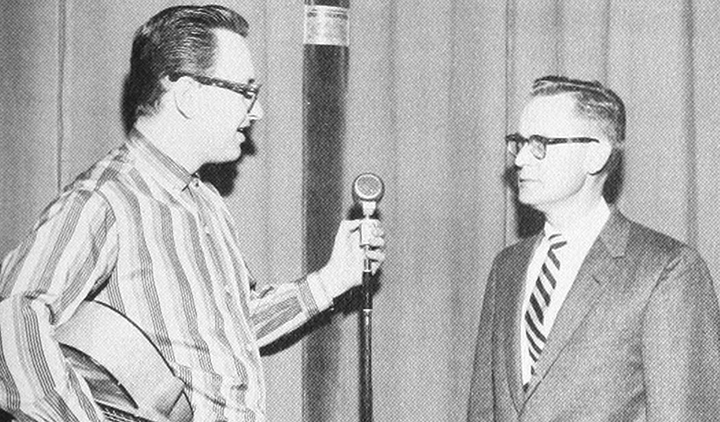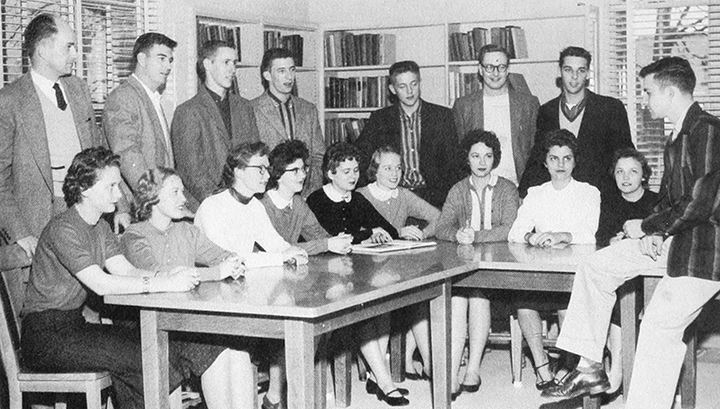John D. Loudermilk’s work has been performed by artists ranging from Johnny Cash to David Lee Roth, from Roy Orbison to Marilyn Manson
By Gordon Anderson
As a Harnett County disc jockey in the late 1970s and early 1980s, Anthony Harrington was responsible every couple of weeks for cataloging the writer and performer of every song his station played.
“Back in those days, you had to report all of that information to the publishing houses,” explained Harrington, who later earned bachelor’s and master’s degrees from Campbell in the 1980s and is now retired from Central Carolina Community College, where he taught both broadcasting and history. “That was how the writer and the performer of each song got their royalty payments.”
Over time, Harrington noticed that one name began to appear under the “writer” column with more and more frequency — that of John D. Loudermilk.
Maybe you’re like Harrington was at first — you don’t immediately recognize the name John D. Loudermilk. But if you were been a fan of popular music at any time between the 1960s and the 1990s, you probably know more than a few of his songs.
There’s “Indian Reservation,” a plaintive lament about the historic suffering of the Cherokee people, a song which Paul Revere & the Raiders took to the top of the Billboard charts in 1971. There’s the harder-edged “Tobacco Road,” with which British group the Nashville Teens scored a Top 20 hit in the 1960s. There’s “Abilene,” George Hamilton IV’s smooth country ballad about a town where the women never treat you mean. There’s the Everly Brothers’ “Ebony Eyes,” which reached the top of the U.K. charts and No. 8 in the U.S. In 1961.
The list goes on and on.
John D. Loudermilk’s songs have been performed by artists ranging from Johnny Cash to David Lee Roth, from Roy Orbison to Marilyn Manson, from Connie Francis to Linda Ronstadt.
“He was just one of those guys who could sit down and write a song about anything, and make it a hit,” Harrington said. “The only other guy I know of who could do that was Hank Williams Sr.”
John D. Loudermilk died in September at the age of 82.
By that time, Harrington had become more than familiar with Loudermilk and his work. The man had, after all, been inducted into the Nashville Songwriters Hall of Fame and the North Carolina Music Hall of Fame. If you were in the radio business like Harrington was, you knew John D. Loudermilk.
What Harrington didn’t know is that he shared an alma mater with Loudermilk, who attended Campbell University in the 1950s, when it was still Campbell College.

According to Loudermilk’s obituary in England’s The Guardian, Loudermilk studied at Campbell for a brief time before dropping out to pursue a songwriting and performing career in Nashville. Although Harrington said he didn’t know any details about Loudermilk’s time in Buies Creek, he was still fascinated that “this guy who was educated in Harnett County went on to write all these songs and have this great long career in music.”
Even though Harrington knew of Loudermilk’s work and North Carolina background (he was born and raised in Durham), he didn’t discover that they both had a connection to Campbell until he learned of Loudermilk’s passing in September. Harrington said knowing that piece of Loudermilk’s biography can strengthen one’s understanding of the type of songs he wrote, many of which would — maybe a little unusual for popular music — explore darker themes such as love lost, broken hearts, and even death.
“John’s father was illiterate, and so he really grew up in an illiterate environment. When he was sent to college, he was able to overcome that, but you could tell by some of his songs that he was still writing about those things, some darker things,” Harrington said. “There’s ‘Break My Mind,’ which paints this picture of a couple who are getting ready to part at the airport, and the woman is saying ‘if you leave, this will break my mind.’ There’s ‘Sad Movies Always Make Me Cry,’ which is about a young woman who goes to the movies and sees her boyfriend with another girl. When she gets home and her mother asks why she’s crying, she has to tell her that it was the sad movie.”
Loudermilk’s songs weren’t exclusively dark, though. Sue Thompson had a Billboard No. 3 hit in 1961 with “Norman,” an upbeat love song about a young woman in love with a boy named Norman. The same year, Connie Francis recorded “He’s Just a Scientist,” whose subject is a workaday researcher who never gets or even seeks any recognition. 1964 saw The Newbeats reach number 6 on the Billboard charts with “Everything’s Alright,” which as the title suggests, is about everything being alright. What all of his work shares, however, is its way of creating a vivid picture in the listener’s mind.
Loudermilk, although primarily known as a songwriter, was also a recording artist with deep family connections not just to music, but to the type of music he ended up playing. That’s another thing he and Harrington have in common.
“He had two famous cousins, Ira and Charlie Loudermilk, who went by the last name Louvin professionally,” Harrington said. “They performed as the Louvin Brothers from 1930 to 1963. They split up in 1963 due to Ira’s heavy drinking and womanizing, and Ira was killed in a car crash in 1965.”

Meanwhile, Harrington’s older cousin Ralph performed as a member of the Bluenotes, a North Carolina-based group that cut several records in the late 1950s, including Loudermilk’s “Sittin’ in the Balcony,” which in 1957 became a hit for Eddie Cochran. (On a side note, Loudermilk’s son Michael, a Nashville songwriter himself, confirms that song has a connection of its own to his college years – “that song was inspired by his time at Campbell, when he sat in the balcony at chapel,” the younger Loudermilk explained.) Coincidentally, the Bluenotes had been signed to Chapel Hill-based Colonial Records, the label which gave Loudermilk his first recording contract — giving Harrington a deeper connection to Loudermilk than he ever knew — one that goes beyond just Campbell University.
“My dad had listened to country music and bluegrass, so we were familiar with a lot of different acts, even before I got into radio,” Harrington said. “But I never knew there were any of these connections. It’s really been very interesting to learn about.”
Gordon Anderson is a musician and writer living in Sanford, N.C.

